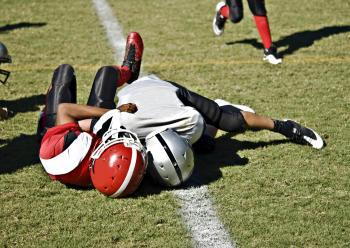Causes of Concussion
The most common and least serious type of traumatic brain injury is called a concussion. The word comes from the Latin concutere, which means "to shake violently."
According to the CDC, between 2001 and 2009, an estimated 173,285 people under age 19 were treated in hospital emergency rooms for concussions related to sports and recreation activities. Other causes include car and bicycle accidents, work-related injuries, falls, and fighting.
How can you tell if you have had a concussion? Is it always serious? And what should you do if you have a concussion? Here are answers to some important questions about concussions.

What Is a Concussion?
As seen in countless Saturday morning cartoons, a concussion is most often caused by a sudden direct blow or bump to the head.
The brain is made of soft tissue. It's cushioned by spinal fluid and encased in the protective shell of the skull. When you sustain a concussion, the impact can jolt your brain. Sometimes, it literally causes it to move around in your head. Traumatic brain injuries can cause bruising, damage to the blood vessels, and injury to the nerves.
The result? Your brain doesn't function normally. If you've suffered a concussion, vision may be disturbed, you may lose equilibrium, or you may fall unconscious. In short, the brain is confused. That's why Bugs Bunny often saw stars.
How Can I Prevent Concussions?
By its very nature, a concussion is unexpected, so it is tough to prevent. But there are several common-sense precautions you can take to lessen the possibility of traumatic brain injury.
-
Wear protective equipment. Participation in high-contact, high-risk sports such as football, hockey, boxing, and soccer can increase the likelihood of a concussion. Skateboarding, snowboarding, horseback riding, and roller blading are also a threat to your brain's health. Wearing headgear, padding, and mouth and eye guards can help safeguard against traumatic head injuries. Wearing a bike helmet can lower the risk of traumatic head injury by 85%. Ensure that the equipment is properly fitted, well maintained, and worn consistently.
-
Drive and ride smart. Always wear a seatbelt, obey posted speed limits, and don't use drugs or alcohol, because they can impair reaction time.
-
Don't fight. Concussions are often sustained during an assault, and more males than females report traumatic head injuries.
Can Children Have Concussions?
Because their heads are disproportionately large compared to the rest of their body, concussions often occur in young children. As kids enter adolescence, they experience rapid height and weight gain. Both are factors that make them more prone to accidents than adults.
If a child has a concussion, an adult should monitor him or her for the first 24 hours. It's important to watch for behavioral changes. Young children, especially, may not be able to fully communicate what they are feeling, so it is critical to watch them closely. Do not give medications, including aspirin, which may cause bleeding, to a child without consulting a doctor.
What Are the Signs of a Concussion?
Concussions can be tricky to diagnose. Though you may have a visible cut or bruise on your head, you can't actually see a concussion. Signs may not appear for days or weeks after the injury. Some symptoms last for just seconds; others may linger.
Concussions are fairly common. Some estimates say a mild brain trauma is sustained every 21 seconds in the U.S. But it's important to recognize the signs of a concussion so you can take the proper steps to treat the injury.
There are some common physical, mental, and emotional symptoms a person may display following a concussion. Any of these could be a sign of traumatic brain injury:
- confusion or feeling dazed
- clumsiness
- slurred speech
- nausea or vomiting
- headache
- balance problems or dizziness
- blurred vision
- sensitivity to light
- sensitivity to noise
- sluggishness
- ringing in ears
- behavior or personality changes
- concentration difficulties
- memory loss
